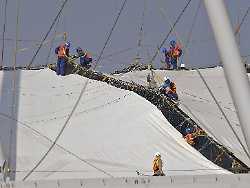Amnesty denounces exploitation
Qatar further restricts freedom of expression ahead of the World Cup
03/29/2022 11:54 am
The World Cup brings Qatar a lot of attention – and with it a lot of criticism. The emirate claims to be working to improve human rights. But Amnesty International finds the opposite: exploitation, discrimination, lack of freedom of expression.
Amnesty International has once again identified significant human rights problems in the World Cup host country Qatar. In its annual report published today, the organization continues to complain about shortcomings in the working conditions for migrants, but also restrictions on freedom of expression and discrimination against women or homosexuals.
Despite government reforms, migrant workers continued to be “affected by exploitation” in 2021 and “had difficulties in freely changing jobs,” it said. Despite assurances to the contrary, the government failed to “introduce and implement reforms”. As a result, “exploitative practices” and the “worst elements” of the kafala system persist.
In the run-up to the World Cup (November 21 to December 18), the right to freedom of expression was further restricted and vaguely worded laws were used “to silence critical voices,” Amnesty wrote. Women and lesbian, gay, bisexual, transgender and intersex people (LGBTI+) continued to be discriminated against “both by law and in everyday life”.
Deaths of thousands still uninvestigated
The emirate has been criticized for human rights violations since the World Cup was awarded. The government repeatedly refers to a large number of reforms, and the world football association FIFA also speaks of improvements in the country. According to media reports, thousands of workers are said to have died on World Cup construction sites.
Authorities “continued to fail to thoroughly investigate the deaths of thousands of migrant workers who died suddenly and unexpectedly in recent years,” Amnesty wrote. As a result of this “omission”, Qatar failed to protect a “central element of the right to life”, “because it could not be determined whether the deaths of the men were related to their working conditions”.
